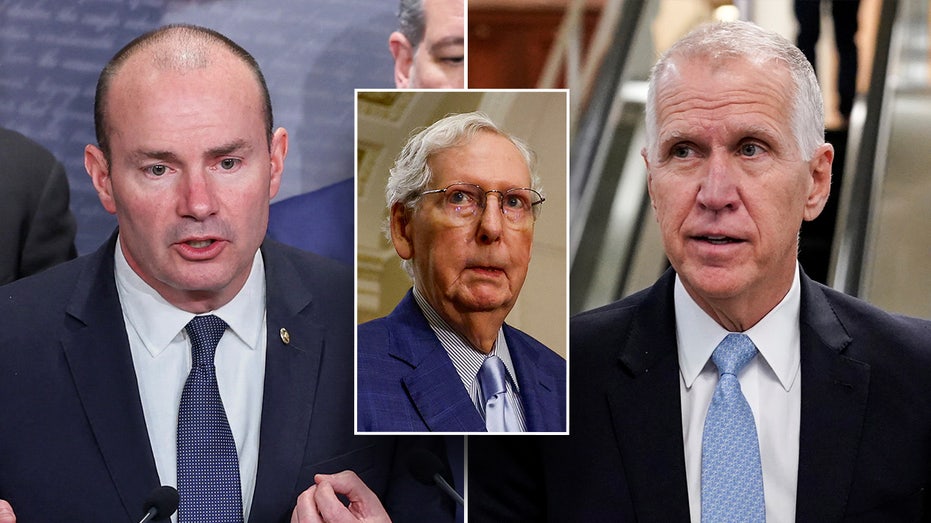As Senate Republicans approach their first competitive leader election in decades to pick a replacement for Senate Minority Leader Mitch McConnell, R-Ky., forces in the conference are pushing dueling pathways for the party as hard-liners hope to decentralize the leader’s authority in backing “Democrat priorities.”
“To avoid the gridlock of business as usual, it is imperative that we structure the Senate in a way that gives individual senators real legislative power, not just lip service,” wrote Sen. Mike Lee, R-Utah, in an op-ed for Fox News this week.
Lee, who is chair of the Senate Republican Steering Committee, said that if former President Trump gets elected next month, there is limited time to pass his agenda with an expected slim majority in the Senate and potentially in the House as well.
MIKE LEE: THE UNNOTICED ELECTION THAT COULD DETERMINE THE FUTURE
Running to succeed McConnell are Senate Minority Whip John Thune, R-S.D., and Sens. John Cornyn, R-Texas, and Rick Scott, R-Fla. For Scott, democratizing the conference has been the guiding principle of his leadership campaign.
Both Thune and Cornyn have expressed openness to changes, and in fact, Cornyn threw his support behind a push for term limits for the Republican leader.
“Moderates will be tempted to join Democrats to pass funding bills that tie Trump’s hands,” Lee warned of Congress under a potential second Trump presidency.
The Utah Republican is among a cohort of senators that has pushed to democratize the Senate GOP conference and decentralize power from the leader, in particular.
Lee outlined specific requests of a potential Republican leader, which included nixing restrictions on individual senators’ ability to offer amendments, allowing significantly longer periods to debate legislation, and requiring broad conference support to “whip” in favor of bills or nominees.
‘DESPICABLE HUMAN BEING’: MCCONNELL’S 2020 THOUGHTS ON ‘SLEAZEBALL’ TRUMP REVEALED IN NEW BOOK
“This would protect Republican leadership from ever being in the position of having to whip for legislation advancing Democrat priorities,” he recently wrote in a conference-wide letter.
While some members of the conference, frustrated with its direction under McConnell, have similarly advocated for such a plan, others have pushed back.
An ally of the minority leader, Sen. Thom Tillis, R-N.C., sent his own letter to the conference just after Lee, writing, “It may be true that many Americans would be shocked to know that members may not be able to offer amendments.”
But, he said, “I suspect many Americans would also be shocked to know that any one member can grind the legislative process to a halt while attempting to advance an amendment that a supermajority of our conference is against.”
On several occasions, members such as Lee and those in agreement with him have disrupted the amendment process advanced by the conference, able to do so by denying unanimous consent. The Senate is often referred to as running on the unanimous consent of members because the upper chamber can very easily be upended by one senator unwilling to allow processes to move forward.
A similar criticism of these senators was offered by a former Republican leadership aide, who said, “Often it is the same cohort of individuals who are decrying the centralization of power that do everything – not with the intention of yielding that result – but all of their behaviors drive the decision-making into the leader’s office at the 11th and a half hour.”
HARRIS BARNSTORMS WISCONSIN IN 1-DAY SWING STATE TOUR TARGETING YOUNG VOTERS
According to the former aide, the ultimate increase in power of leaders is the result of years and years of “institutional pressures.”
“This was a long slide into the marginalization of rank-and-file senators in favor of leadership.”
In fact, they said, no matter who is elected as the next leader, they cannot decentralize power and democratize the GOP conference on their own.
Republican strategist Ron Bonjean, former top spokesperson to former Senate Majority Leader Trent Lott and former chief of staff of the Senate Republican Conference, said that “Senator Tillis is acting as a proxy for McConnell” who isn’t publicly discussing changes to the conference but is passionately arguing against certain reforms in closed-door meetings.
According to a Republican source familiar, “Tillis is running McConnell’s ground game” when it comes to preserving the conference’s norms and guardrails.
In his initial letter, Lee told colleagues the leader election is “a once-in-a-generation opportunity” to “lower the temperature of our politics and restore public trust in our institutions.”
Tillis specifically opposed negotiating reforms as part of the race, writing, “I believe we need to elect a new leader first, rather than negotiate terms with the Republican leader candidates before the vote.”
STRIKING BOEING WORKERS BOO AFTER DEMOCRATIC SEN MARIA CANTWELL CRITICIZES TRUMP
The North Carolina Republican concluded, “I know Mike’s concerns about the voices of some members being silenced are sincere, but I believe his proposals to address these concerns are ill-advised.”
The former GOP leadership aide pointed to the House of Representatives, suggesting Republicans are looking “at what’s happening in the House with a leader, the speaker in this case, who’s been politically weakened by conference rules.”
They said senators are seeing “the chaos that episodically prevails” in the House and are asking, “Is this really what we want in the Senate?”
According to Bonjean, this feud “helps to muddy the waters for Thune and Cornyn” in their leader bids.
“What will be interesting to watch is the barometer of how many senators that will actually back up Sen. Lee’s trial balloon,” he added.
Lee’s ideas for the conference come as he and others have been left particularly unhappy with the relatively frequent late-night and last-minute spending packages, supplemental aid bills and re-authorization measures that have included what he considers to be Democrat priorities.
























